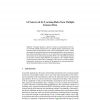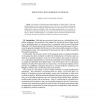1614 search results - page 27 / 323 » Learning Rules and Their Exceptions |
132
click to vote
ICMLA
2009
14 years 11 months ago
2009
Languages that combine predicate logic with probabilities are needed to succinctly represent knowledge in many real-world domains. We consider a formalism based on universally qua...
100
click to vote
ECML
2001
Springer
15 years 5 months ago
2001
Springer
Abstract. This paper proposes a generic extension to propositional rule learners to handle multiple-instance data. In a multiple-instance representation, each learning example is r...
105
click to vote
BPM
2003
Springer
15 years 5 months ago
2003
Springer
A top-down approach for workflow design is proposed in the framework of Petri net theory. Simple but powerful refinement rules are proposed that guarantee soundness of the resultin...
RELMICS
2000
Springer
15 years 4 months ago
2000
Springer
Abstract. We introduce an implication-with-possible-exceptions and define validity of rules-withpossible-exceptions by means of the topological notion of a full subset. Our implica...
121
click to vote
APIN
2000
15 years 1 months ago
2000
Defeasible logic is a system of reasoning in which rules have exceptions, and when rules conflict, the one that applies most specifically to the situation wins out. This paper repo...


